Top lawyer: AFL investigation into Crows camp a ‘nonsense’ that ‘does not pass muster’
Don Pyke left Adelaide in the wake of the toxic fallout from the infamous Crows camp. After the latest revelations uncovered by NewsCorp, he is calling on the club to address exactly what happened.
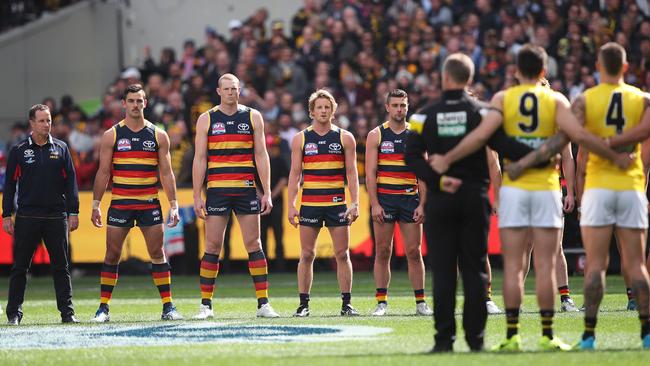
Crows
Don't miss out on the headlines from Crows. Followed categories will be added to My News.
Ex-Adelaide coach Don Pyke says Crows chiefs need to address the infamous 2018 pre-season camp “once and for all”.
Pyke, who left the club in the wake of the camp’s toxic fallout with two years to run on his contract, said the club needed to explain the “context” around some of the things that happened on the four-day Gold Coast trip.
“It’s probably disappointing it’s continuing to be sort of discussed. I mean clearly, the club’s viewpoint is that they want to move on,” Pyke told ABC radio, following a fresh News Corp investigation into the saga.
“I know talking to some of the players who are still there, clearly they want to leave that behind and focus on the footy that’s going forward.
“(But) I think it’s probably a conversation that’s due with the club about, well, how they want to address this once and for all.
Kayo is your ticket to the 2020 Toyota AFL Premiership Season. Watch every match of every round Live & On-Demand. New to Kayo? Get your 14-day free trial & start streaming instantly >
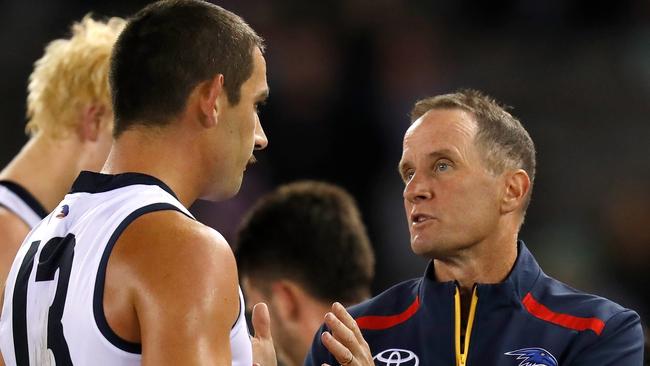
“As I’ve said previously, the intention around that camp was very clear.
“The execution had some gaps and holes and some mistakes were made and, you know, that’s been addressed.
“But I think there’s also an issue at the moment with some context around some of the things that were done and the purpose behind those, which probably hasn’t been tabled.”
However, Pyke said he did not believe the camp was to blame for the club’s disastrous 0-6 start to the 2020 season.
“It’s a long bow to draw,” Pyke said.
“I think the list at Adelaide is going through a transitional phase, there’s no question about that. We’ve seen some players have left the club for various reasons.
“Last week, for instance, in their forward line I think Tom Lynch had 140 games and the rest were all sub-10 games. So they’re starting to expose some of those guys to AFL footy and with that will go consistency.
“I think if you asked those guys, some of them would go ‘well the performance now has nothing to do with what happened on a camp two-and-a-half years ago.”
WAS CROWS CAMP PROBE AN AFL ‘COVER UP’?
Serious doubts have been raised over the “independence” of the AFL’s investigation into the infamous Adelaide Crows pre-season camp.
The AFL integrity unit cleared the Crows of any wrongdoing in the “cult-like” team-building camp and concluded that there had been “no breach of industry rules”.
But a top commercial lawyer has claimed the AFL would have exposed itself to potentially damaging legal proceedings if it had made an adverse finding against the club over the toxic four-day bonding session on the Gold Coast in January 2018.
Under the terms of the Crows’ constitution — quietly revised six years ago — the AFL took effective control of the Adelaide board and became the club’s ultimate authority.
The league appoints seven of the nine Crows directors and has sole voting rights of all matters at annual general meetings other than the election of the two remaining board members.
South Australian lawyer Greg Griffin said the AFL had made a “serious error” in claiming its probe into the Gold Coast camp was independent.
“If you control the board, you control the club,” Griffin said.
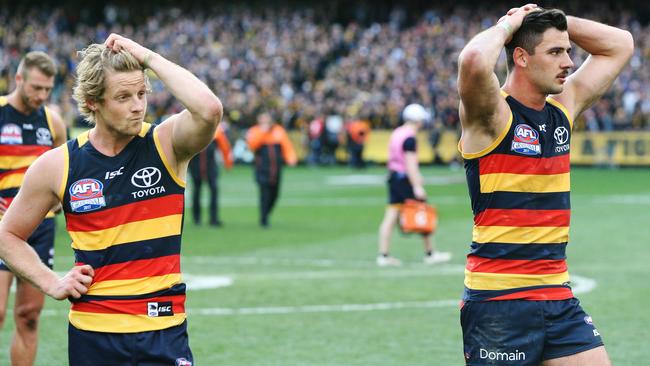
“And it makes a nonsense of the suggestion that the AFL can conduct an independent inquiry into the operations of the club”
“The AFL is inherently unlikely to come out and publish a report that concludes that the club’s conduct has exposed it and hence the AFL to a legal liability.
“It was never going to happen. The process was completely deficient in terms of corporate governance.”
Griffin said any Crows player wanting to sue the club for psychological damage would almost certainly add the AFL to the legal proceedings.
“What the AFL has done is attempt to reduce its liability to an inevitable claim that will be brought by players on the camp,” he said.
News Corp can also reveal that Crows powerbrokers recently approached former club chief executive and salary cap cheat Steven Trigg about a potential return to replace Rob Chapman as chairman or to serve on the board.
Trigg, who would have returned as an AFL-appointed director, said it was not an official approach and he did not have time to return to West Lakes in any capacity.
“It is flattering if that’s being thought about by anyone, but the reality is I have so much to do in my professional life at the moment I just don’t have time,” Trigg said.
Trigg is the CEO of the Randall Wine Group and his boss, Barossa Valley wine magnate Warren Randall, was appointed to the Crows board last week.
Randall replaces Jim McDowell, who has stepped down after three years and is chief executive of the South Australian Government’s department of premier and cabinet.
The AFL has come under fire since the Crows were cleared of any wrongdoing over the Gold Coast camp, despite revelations of extreme mental, physical and cultural abuse.
“Why does the AFL even have an integrity unit if not to do something about things like this, particularly after the lessons of Melbourne and Essendon,” senior journalist Caroline Wilson told Channel 9 this month.
“Terrible things happened on that camp, some so disgusting they’re unprintable, and to younger players. And yet head office investigated and did nothing.
“The cover-up seems to have done as much damage as the crime.”
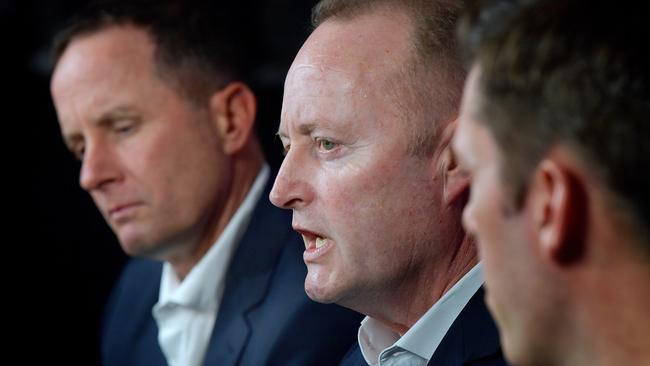
Craig Hutchison, whose Crocmedia business controls the AFL radio rights, added: “It did feel like an investigation at the time with a predetermined outcome before they got into it.”
Griffin said: “The fact that the AFL controls the Adelaide Football Club would at least give cause for some people to hold that view.
“The AFL have blundered by purporting to be the appropriate body able to undertake the review, because they are not independent.”
He said that the AFL should not have undertaken the inquiry in the first place.
“It should have referred it to an independent body,” Griffin said.
“The AFL investigating the pre-season camp was untenable.
“Why would the AFL — the effective controller of the club — come out and say, ‘This was a disgrace and it should never have happened’?
“The response there from the AFL was entirely predictable.
“For them to conduct an integrity inquiry, which is then used as a shield by the Crows, to say we did everything right, does not pass muster.”
The Crows have repeatedly relied on the AFL integrity unit’s findings to argue they did nothing wrong.
The AFL said it had conducted a comprehensive investigation into the camp.
Adelaide and Port Adelaide secured their independence from the SANFL in March 2014 when their licences were bought from the state body for more than $18 million with AFL financial support.
The restruck Crows’ constitution stipulates that the AFL has effective control of the club until October 2028.
The league said it had similar governance arrangements with Port Adelaide, Greater Western Sydney, Gold Coast and Sydney, which was privately owned until 1993.
A league spokesman said: “The AFL has constitutional control of a number of clubs across the competition including the Adelaide Crows.
“The day to day running of those clubs is governed by their individual boards and executive management teams.
“The AFL investigation into the Adelaide Crows camp concluded there were failings in the manner in which the football club identified, implemented and managed the program, however there was no violation of industry rules.
“The AFL made recommendations, which at the time were adopted, on improved governance and compliance in relation to the protection of the players, officials and staff.
“This included further investment in the club’s integrity area and the introduction of an agreed approval process to be conducted ahead of any preseason camp or activity that involves an external provider ensuring cultural safety practices are satisfied.”
THE QUESTIONS NEWS CORP PUT TO THE AFL
1. Can you confirm that under the terms of the Adelaide Football Club constitution, the AFL appoints seven of the nine club directors?
2. Can you confirm that as a result of clause 8 of the AFC constitution, “no Member other than the AFL has a right to receive notice of, attend at or vote at a meeting of the AFC” (other than in respect of the election of two other members of the board)?
3. Given the effective control the AFL has over the AFC, wouldn’t any investigation into the club’s 2018 pre-season camp by the AFL’s integrity unit have been compromised from the very start?
4. Why wasn’t an independent third-party investigator used to conduct the investigation?
INSIDE STORY: HOW SA’S POWER CLUB FELL OFF A CLIFF
— Michael Warner and Reece Homfray
It was the camp that ripped the Adelaide Crows apart and two years on from the toxic Gold Coast trip participants still can’t be sure of what took place.
When asked about allegations some players were told they needed to be “so tight that if a teammate slept with your wife it would be OK”, a member of the ill-fated camp this week told News Corp the full truth of what went down would probably never see the light of day.
The camp member said he had a vague recollection of the sordid suggestion being raised on the four-day trip.
“We were in such a state of confusion, it was like a trance, there were times where we would come-to two days after and say, ‘What did we just do?’. It’s hard to remember exactly what we did or what was said and we were in different groups,” he explained.
News Corp this week put the wife-sharing comment to a former senior club official, who did not respond.
A Crows spokesman said: “The camp was more than two years ago and there has been considerable personnel changes both on and off the field, and the club is now focussed on this season and beyond. As previously stated, the AFL conducted a thorough investigation and found there was no breach of industry rules.”
The 2018 pre-season camp was designed to push a Grand Final team one step further, but instead, it pushed them off a cliff into AFL oblivion.
On the final day of the camp players and coaches gathered in a room and wept openly.
They were told the experience was the “best thing” they had ever done.
It had supposedly allowed them to release the baggage from their past that had been holding them back from reaching their full potential.
But that could not have been further from reality.
The camp backfired sensationally, fracturing the playing group and eventually pitting many against management.
Some players felt club bosses had failed to show contrition for what they had been forced to endure and some were aggrieved that personal information had seemingly fallen into the wrong hands.
As disgruntled players began to desert West Lakes and South Australia’s once all-conquering club, the football industry became awash with damning details of what happened at the Crows camp.
Tales included players being blindfolded, tied to trees, driven around in blackened buses and even asked to cup their testicles while making powerful statements to their groups.
A report in Nine newspapers this month said players were confronted by men in army fatigues, carrying fake automatic weapons and told to keep their heads down on a bus as heavy metal music blared through the speakers.
Players also had their mobile phones confiscated.
Now sitting at the bottom of the ladder, winless at 0-6 and staring at the worst start to a season in club history, the task of rebuilding a broken club has been handed to rookie coach Matthew Nicks.
“I wasn’t here, with all respect,” Nicks said when asked about the camp.
“All my conversations with our players are about moving forward, you come in as a coach and start to talk about the future, where you’re heading as a club and we’ve done an amazing job with that.
“I’ll talk to them again, I’ll go back and say ‘how are you feeling?’ We don’t hide anything, we have great, open communication around how our guys are going and what affects them, how do we get them to play their best footy.”
MORE AFL NEWS:
Eddie Betts moving back to Carlton is Adelaide Crows’ biggest mistake in their 29-year history
Bryce Gibbs in line for recall to replace injured Rory Sloane
Football analyst Mick McGuane names his final top-eight for the ever-changing 2020 season
St Kilda hopeful no privacy breaches have taken place after medical notes were stolen
AFL IN CONTROL
Not everyone sees the Gold Coast camp as the beginning of the end.
Top South Australian lawyer Greg Griffin identifies March 27, 2014 as the day the Adelaide Crows sold their soul.
Under an agreement struck with the SANFL, the Crows and cross-town rival Port Adelaide supposedly secured their independence by buying their AFL licences back from the state league body for a combined $18 million.
The AFL covered the Crows’ costs of about $11.3 million to be repaid over 15 years, ending in October 2028.
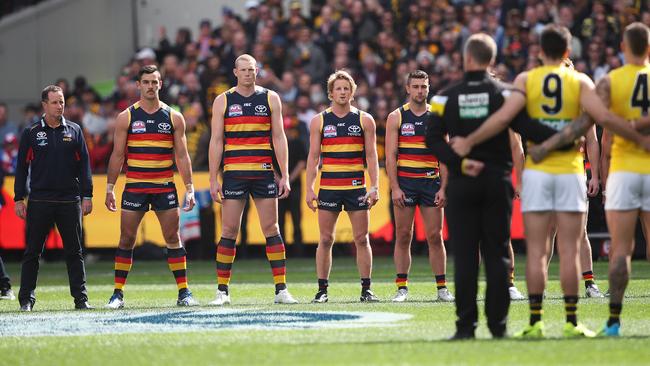
In return, the AFL assumed effective control of the club and the right to appoint seven of its nine directors under the terms of a revised Adelaide Football Club constitution.
“What the Crows did in this transaction was allow the AFL to in effect take security over the whole company to guarantee the repayment to it of the $11.3 million purchase price — to the extent that all but two directors on the Crows board are now appointed by the AFL,” Griffin explained.
“Whoever did this deal handed over control of the club in terms of how it is effectively managed and controlled to the AFL until October 2028.
“They have allowed the members no effective power at all.
“So what you have is a club controlled by the AFL to secure a loan.
“We are talking here about a club with revenues of close to $60 million that has had
enormous financial success off the field.”
In essence, Griffin says, the Crows’ 80,000 paid-up members have zero say in the direction of their club.
“It’s quite scary that the AFL have been allowed to effectively control the two South Australian clubs, essentially as a secured creditor,” he said.
“In many respects they are acting as a receiver and manager. They are the major creditor and on that basis can control what the clubs do by virtue of their right to appoint seven of the nine directors to the board.
“Theoretically, the Crows and Power boards need the approval of the AFL to borrow the money to get rid of them.
“Neither club should ever have allowed that to happen. It took away their autonomy.
“I mean can you imagine Carlton or Collingwood agreeing that its board members be selected by the AFL?”
The simple solution, Griffin said, would be for the Crows to repay whatever amount is still outstanding to the AFL and re-assume control of the club.
“Only then can the club be returned to the members. That’s when you’ll get people
power,” he said.
WORST START IN HISTORY
If Adelaide loses to St Kilda at home on Monday night it will be the worst start to a season in club history.
The Crows opened with 0-6 in 2010 under Neil Craig, 0-5 in 2000 and 0-4 in 2004 both under Gary Ayres, and twice started a season 0-3.
But they’ve never gone 0-7 which they must stare down in their first proper home game of the season next week.
While they dwell at the bottom of the ladder in full rebuild mode, their hometown rivals Port Adelaide sit at the top and are in premiership contention with a 5-1 record.
And the sliding doors moment on the tarmac at Adelaide Airport when they returned home from their Queensland hub this month was impossible to miss.
After 16 days in the same hotel they shared a flight home and the chartered flight touched down just after 9pm.
While Port Adelaide players made their way onto a nearby bus and were taken home, the Crows waited for their bags in the dark. And waited, and waited.
They were still waiting after 10pm by which time the Power players were home, having arranged to collect their bags from the footy club on Tuesday.
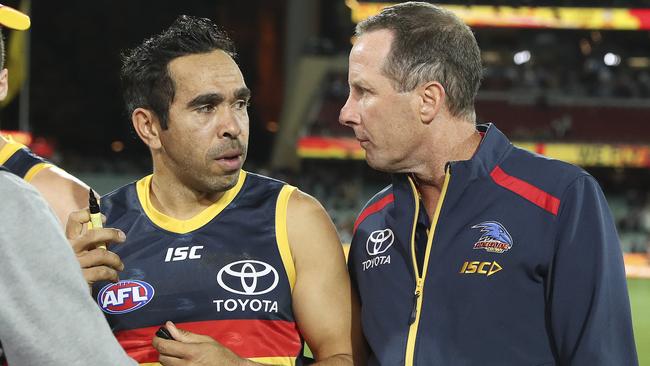
It was the final body blow for the Crows who had endured a punishing fortnight on and off the field but coach Matthew Nicks insisted morale remained strong.
“We quite enjoyed being up here, it was great being in a hub environment and being able to work through it,” he said after the Round 5 loss to Fremantle.
“We weren’t getting the results we were after but we were off-field, we were getting some great results off-field.”
Chief executive Andrew Fagan agreed.
“I was speaking with Matthew Nicks last night and had a long chat with him and he said he just can’t fault them at the moment, they’re working their backsides off, they acknowledge where they are and where they need to improve and I think everyone understands the rebuild process we’re going through,” Fagan said.
“But they’ve enjoyed each other’s company, the vibe inside the group is a positive one and they’re loving the leadership that Nicksy is providing.
“All of those things are good but we’re on a journey at the moment, there are going to be a few bumps along the way, it’s been a tough start but we’re looking forward to improvement coming.”
The Crows held a series of meetings inside the hub in a bid to turn things around, including an immediate post-match review of their horror Round 3 loss to the Gold Coast back at the hotel that night.
“We sat around in the meeting room for an hour or so once we got back to the hotel and talked about where we’re at and how we’re going to get out of this slump,” Brodie Smith said.
“We got back, did our recovery and had dinner, then went into the meeting room and Nicksy kicked us off.”
A day later they held a player-only lunch at the Southport Football Club where Smith said they “talked about anything but footy”.
There were better signs against West Coast in Round 6 but the Crows were still unable to break their winless drought which now extends back to Round 20 last season.
A 10-YEAR CLEANOUT
The player drain at Adelaide is often traced back to Kurt Tippett leaving the Crows after the 2012 preliminary final and taking up a lucrative offer with Sydney.
But the exodus started the year before with Jack Gunston’s inglorious exit after his regulation two-year deal as a high Victorian draft pick, and it compounded the loss of their defensive bookend in Phil Davis who was poached by GWS at the same time.
Gunston told the club he was leaving the day before its presentation evening and he was subsequently stripped of the ‘Mark Bickley Award’ which honours the team’s best young player.
“It’s a management decision – my decision – that as a football club we will not reward someone who walks out,” then CEO Steven Trigg said at the time.
The Crows were closing in on a new deal with Gunston who reportedly walked in at 11am to tell them he was on a 2pm flight home and not coming back after 14 games.
Gunston has now played 198 AFL games and in four grand finals for three premierships at Hawthorn.
Tippett left the following year amid a salary cap scandal when he and the club were punished for a breach and draft tampering with fines, a suspension and being stripped of key draft picks.
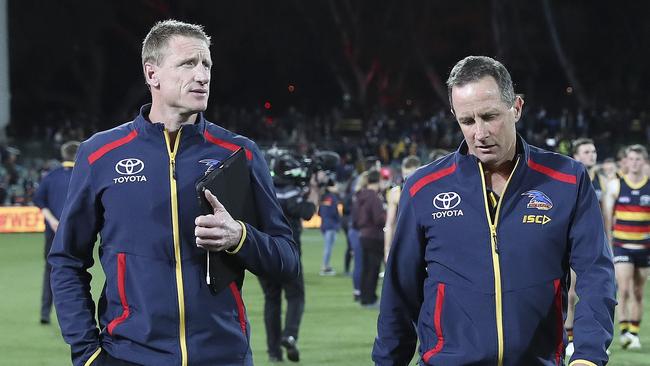
Patrick Dangerfield (Geelong) left for family reasons at the end of 2015, Jake Lever (Melbourne) and Charlie Cameron (Brisbane) accepted big money offers immediately after the 2017 grand final, and Mitch McGovern joined Carlton after the 2018 season which his manager said was because of the controversial pre-season camp.
Then came the big clean-out at the end of 2019 which was their own doing. Josh Jenkins (Geelong), Hugh Greenwood (Gold Coast), Cameron Ellis-Yolmen (Brisbane), Alex Keath (Western Bulldogs), Eddie Betts (Carlton) all joined rival lists in the off-season after the football department was overhauled.
Senior coach Don Pyke left on mutual terms according to the club despite having two years left to run on his contract, and both his senior assistant coach Scott Camporeale and football manager Brett Burton were victims of the external review which recommended significant change.
Pyke has returned to Perth where he is commentating for the ABC as is Camporeale who remains in Adelaide and is a panellist on weekend Grandstand.
Camporeale declined to comment when contacted by News Corp last week, but told the ABC on Saturday that the club had ordered players and officials not to speak about the camp.
“For me it’s water under the bridge, I can’t say too much because the club has said we’re not allowed to, it’s up to the club,” he said.
“Personally we’d love to come out and say everything just to get clear air so there is no innuendo and be really clear around what happened.
“What I will say is the intention (to improve with the camp) was there, the execution probably wasn’t.”
Burton now works in a tourism-related business in Adelaide and has detached himself from football entirely as he focuses on his family which includes five children.
The former football boss settled with the Crows out of court in December after he argued unfair dismissal and reputational damage, before travelling around Australia with his family.
He also declined to comment when contacted last week.
CULTURE PROBLEM
The fallout from missing finals for two consecutive years after the 2017 Grand Final led to the club commissioning an external review led by Hawthorn great Jason Dunstall and Fremantle champion Matthew Pavlich.
While Pyke had already gone and Taylor Walker had stepped down as skipper, the review led to Camporeale and Burton’s departures but also identified breakdowns in personal relationships within the football club which announced it would create a new ‘leadership and culture’ position and later appointed former Richmond player Daniel Jackson. SANFL general manager Adam Kelly was also brought in as the club’s new football manager.
Dunstall said he was surprised at the depth of the issues the review uncovered.
“I take my hat off to the board because they were probably aware of most things but needed confirmation and probably they didn’t realise how deep some of the issues were as well,” Dunstall said.
“It was an environment that desperately required change. Let’s just say it was a little dysfunctional in terms of groups not working together, so if they all band together they’re very well placed to rebuild the culture quickly.
“They had to arrest that as quickly as possible and to their credit they made some courageous decisions.”
But Greg Griffin said the Dunstall-led review was yet another example of the club’s ineptitude.
“That review should have been conducted by people outside of football, of who two apparently were, not by retired players. I find it incredible to have commentators review the operations of a club in the competition upon which they commentate,” he said.
“Go and get some people who do this type of review for a living.”
The review was designed to fix the off-field dramas which had plagued the club but things have been anything but smooth sailing in the six months since.
Tyson Stengle was banned for drink-driving, a group of players breached social distancing rules in the Barossa Valley, Mark Ricciuto angered ex-players by releasing their salary on radio and made headlines by engaging in a Twitter back-and-forth with Hugh Greenwood, and Andrew McLeod slammed the club’s culture, a perceived lack of authenticity and said he didn’t feel welcome at West Lakes.
But inaugural Crows coach Graham Cornes believes Adelaide is an easy target, and a sitting duck when it’s losing games.
“The club is in very good hands and you need to be in the crisis we’re having. I’m concerned about the team, of course, but occasionally teams in the AFL it’s designed for them to have down periods and we’re just not used to it,” Cornes said.
“I’ve seen positive examples in the last couple of games but the complete picture is not there.
“They fix one aspect and another area of weakness is exposed. It will take some time and we just might need to be resigned to the fact that there will be a couple of poor years from which we can build again.
“The fact that the club is a sitting target for anyone to take pot shots, any number of Melbourne journalists having a crack at the Adelaide footy club without knowing the full circumstances or having to live here.
“They talk about Adelaide in the manner they would never talk about clubs in Melbourne that have just as many problems.”
Originally published as Top lawyer: AFL investigation into Crows camp a ‘nonsense’ that ‘does not pass muster’
